Travel and Tourism Sector Analysis: History, Impact, and Policies
VerifiedAdded on 2019/12/28
|12
|4271
|272
Report
AI Summary
This report provides a comprehensive analysis of the travel and tourism sector, beginning with its historical development and structural components, including tour operators, regulatory bodies, and accommodation. It examines the functions of governmental bodies, government-sponsored entities, and international agencies, such as Visit Britain and the WTO, in shaping the industry. The report further explores the influence of local and national economic policies on the sector's success, highlighting economic growth, service integration, and funding. It also addresses the implications of political changes on tourism in various countries. Moreover, the report investigates the factors affecting tourism demand and how supply has adapted, along with the economic, environmental, and social impacts of tourism, and strategies to mitigate negative effects while maximizing positive outcomes. The report concludes with a discussion of the sector's overall dynamics and future trends.
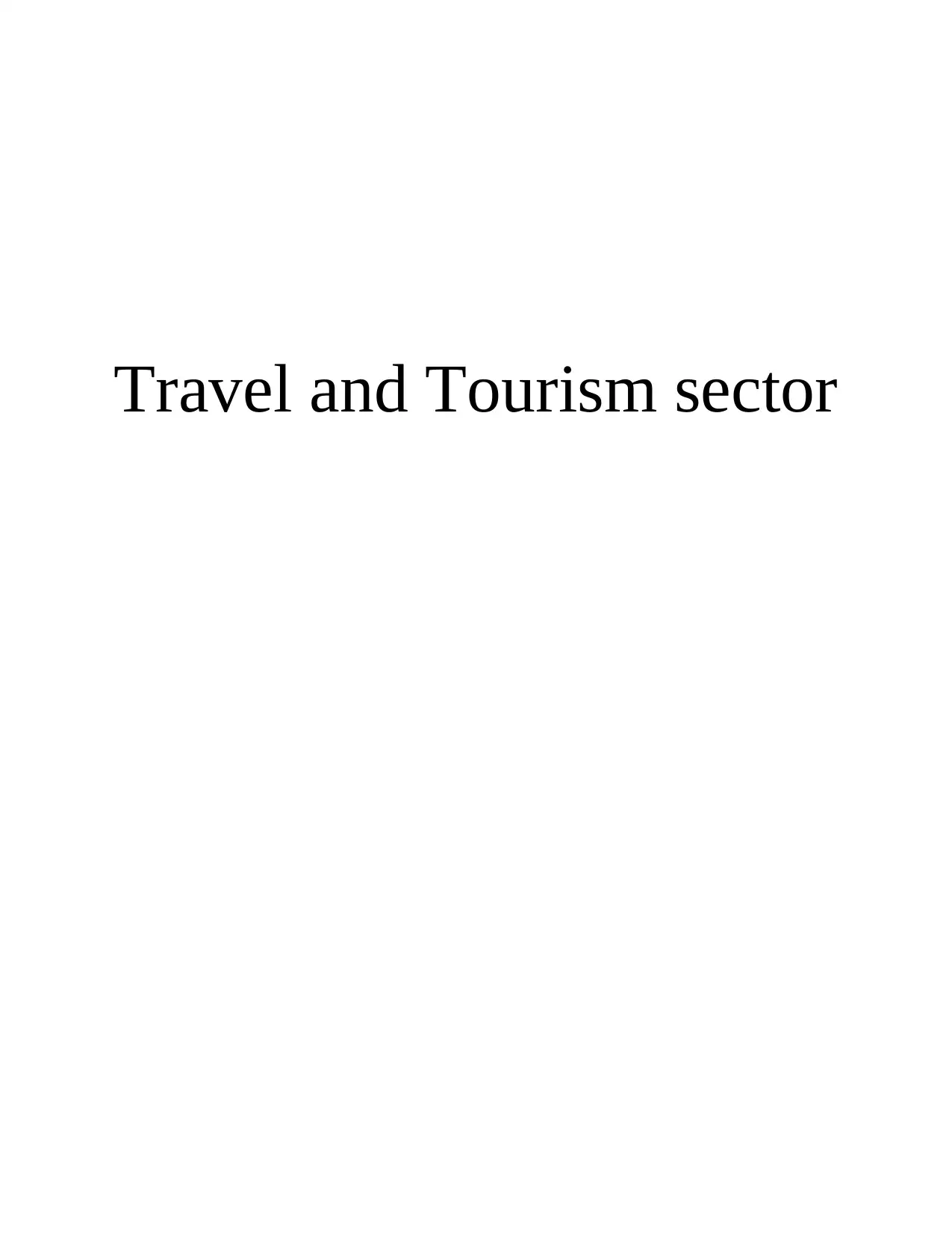
Travel and Tourism sector
Paraphrase This Document
Need a fresh take? Get an instant paraphrase of this document with our AI Paraphraser
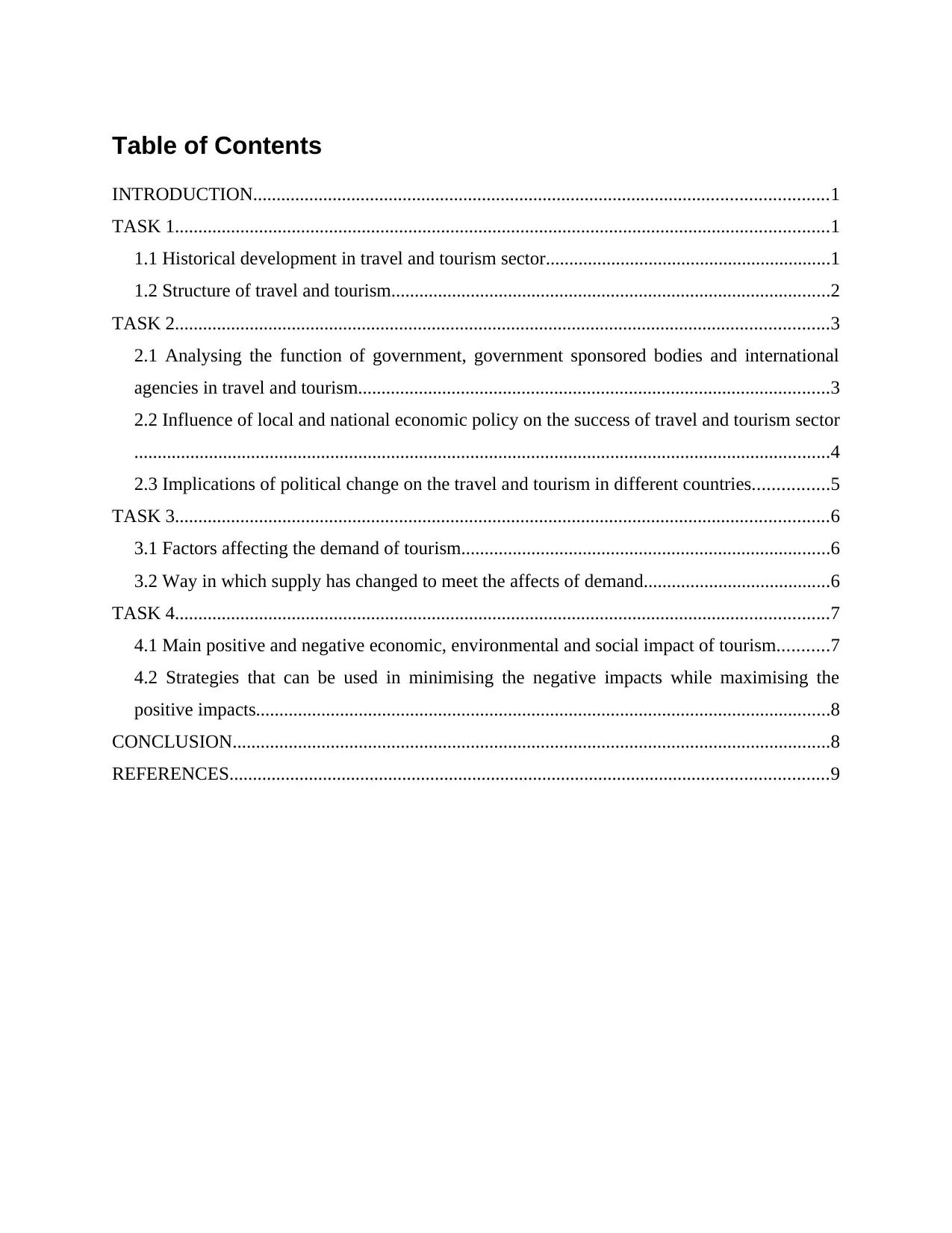
Table of Contents
INTRODUCTION...........................................................................................................................1
TASK 1............................................................................................................................................1
1.1 Historical development in travel and tourism sector.............................................................1
1.2 Structure of travel and tourism..............................................................................................2
TASK 2............................................................................................................................................3
2.1 Analysing the function of government, government sponsored bodies and international
agencies in travel and tourism.....................................................................................................3
2.2 Influence of local and national economic policy on the success of travel and tourism sector
.....................................................................................................................................................4
2.3 Implications of political change on the travel and tourism in different countries................5
TASK 3............................................................................................................................................6
3.1 Factors affecting the demand of tourism...............................................................................6
3.2 Way in which supply has changed to meet the affects of demand........................................6
TASK 4............................................................................................................................................7
4.1 Main positive and negative economic, environmental and social impact of tourism...........7
4.2 Strategies that can be used in minimising the negative impacts while maximising the
positive impacts...........................................................................................................................8
CONCLUSION................................................................................................................................8
REFERENCES................................................................................................................................9
INTRODUCTION...........................................................................................................................1
TASK 1............................................................................................................................................1
1.1 Historical development in travel and tourism sector.............................................................1
1.2 Structure of travel and tourism..............................................................................................2
TASK 2............................................................................................................................................3
2.1 Analysing the function of government, government sponsored bodies and international
agencies in travel and tourism.....................................................................................................3
2.2 Influence of local and national economic policy on the success of travel and tourism sector
.....................................................................................................................................................4
2.3 Implications of political change on the travel and tourism in different countries................5
TASK 3............................................................................................................................................6
3.1 Factors affecting the demand of tourism...............................................................................6
3.2 Way in which supply has changed to meet the affects of demand........................................6
TASK 4............................................................................................................................................7
4.1 Main positive and negative economic, environmental and social impact of tourism...........7
4.2 Strategies that can be used in minimising the negative impacts while maximising the
positive impacts...........................................................................................................................8
CONCLUSION................................................................................................................................8
REFERENCES................................................................................................................................9
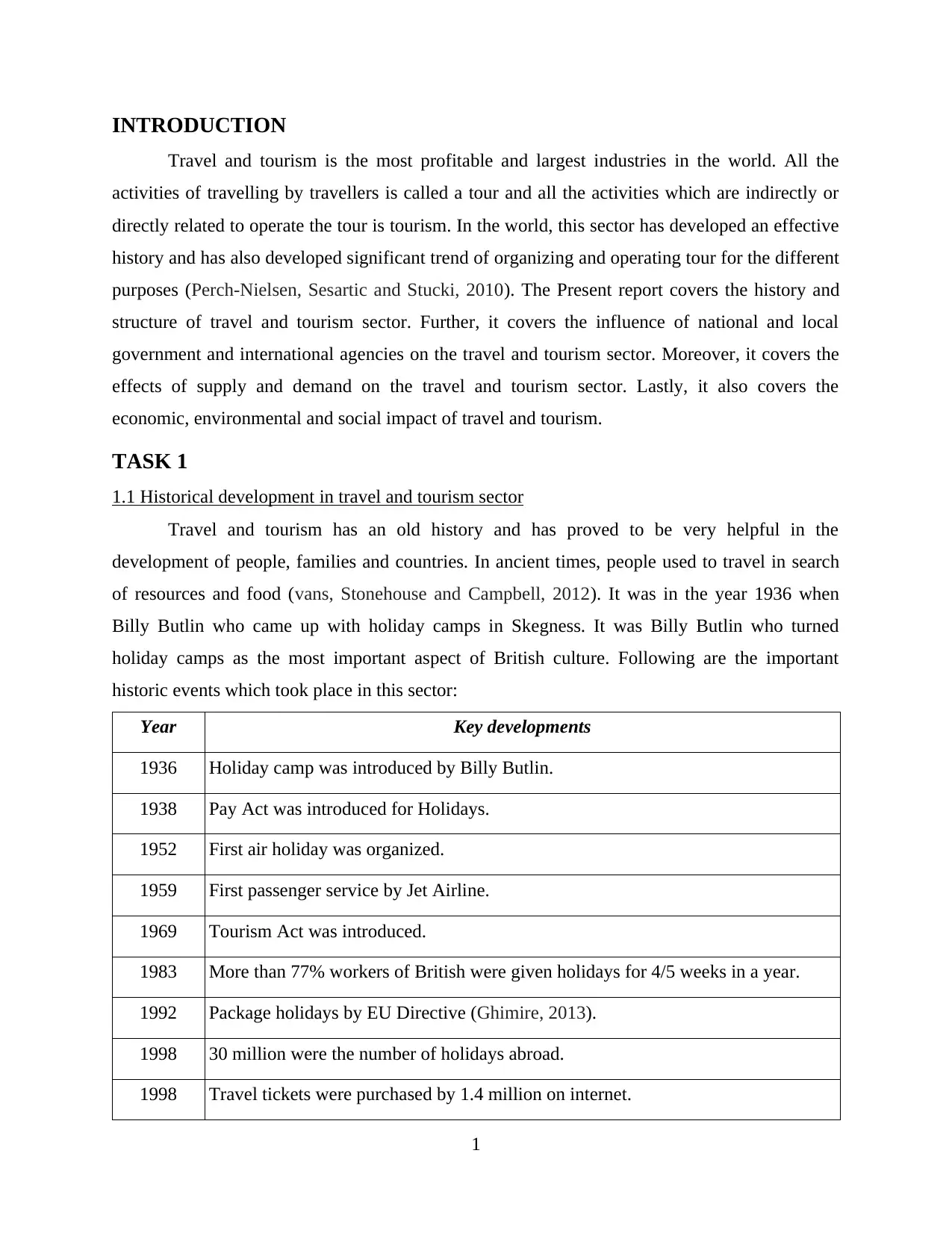
INTRODUCTION
Travel and tourism is the most profitable and largest industries in the world. All the
activities of travelling by travellers is called a tour and all the activities which are indirectly or
directly related to operate the tour is tourism. In the world, this sector has developed an effective
history and has also developed significant trend of organizing and operating tour for the different
purposes (Perch-Nielsen, Sesartic and Stucki, 2010). The Present report covers the history and
structure of travel and tourism sector. Further, it covers the influence of national and local
government and international agencies on the travel and tourism sector. Moreover, it covers the
effects of supply and demand on the travel and tourism sector. Lastly, it also covers the
economic, environmental and social impact of travel and tourism.
TASK 1
1.1 Historical development in travel and tourism sector
Travel and tourism has an old history and has proved to be very helpful in the
development of people, families and countries. In ancient times, people used to travel in search
of resources and food (vans, Stonehouse and Campbell, 2012). It was in the year 1936 when
Billy Butlin who came up with holiday camps in Skegness. It was Billy Butlin who turned
holiday camps as the most important aspect of British culture. Following are the important
historic events which took place in this sector:
Year Key developments
1936 Holiday camp was introduced by Billy Butlin.
1938 Pay Act was introduced for Holidays.
1952 First air holiday was organized.
1959 First passenger service by Jet Airline.
1969 Tourism Act was introduced.
1983 More than 77% workers of British were given holidays for 4/5 weeks in a year.
1992 Package holidays by EU Directive (Ghimire, 2013).
1998 30 million were the number of holidays abroad.
1998 Travel tickets were purchased by 1.4 million on internet.
1
Travel and tourism is the most profitable and largest industries in the world. All the
activities of travelling by travellers is called a tour and all the activities which are indirectly or
directly related to operate the tour is tourism. In the world, this sector has developed an effective
history and has also developed significant trend of organizing and operating tour for the different
purposes (Perch-Nielsen, Sesartic and Stucki, 2010). The Present report covers the history and
structure of travel and tourism sector. Further, it covers the influence of national and local
government and international agencies on the travel and tourism sector. Moreover, it covers the
effects of supply and demand on the travel and tourism sector. Lastly, it also covers the
economic, environmental and social impact of travel and tourism.
TASK 1
1.1 Historical development in travel and tourism sector
Travel and tourism has an old history and has proved to be very helpful in the
development of people, families and countries. In ancient times, people used to travel in search
of resources and food (vans, Stonehouse and Campbell, 2012). It was in the year 1936 when
Billy Butlin who came up with holiday camps in Skegness. It was Billy Butlin who turned
holiday camps as the most important aspect of British culture. Following are the important
historic events which took place in this sector:
Year Key developments
1936 Holiday camp was introduced by Billy Butlin.
1938 Pay Act was introduced for Holidays.
1952 First air holiday was organized.
1959 First passenger service by Jet Airline.
1969 Tourism Act was introduced.
1983 More than 77% workers of British were given holidays for 4/5 weeks in a year.
1992 Package holidays by EU Directive (Ghimire, 2013).
1998 30 million were the number of holidays abroad.
1998 Travel tickets were purchased by 1.4 million on internet.
1
⊘ This is a preview!⊘
Do you want full access?
Subscribe today to unlock all pages.

Trusted by 1+ million students worldwide
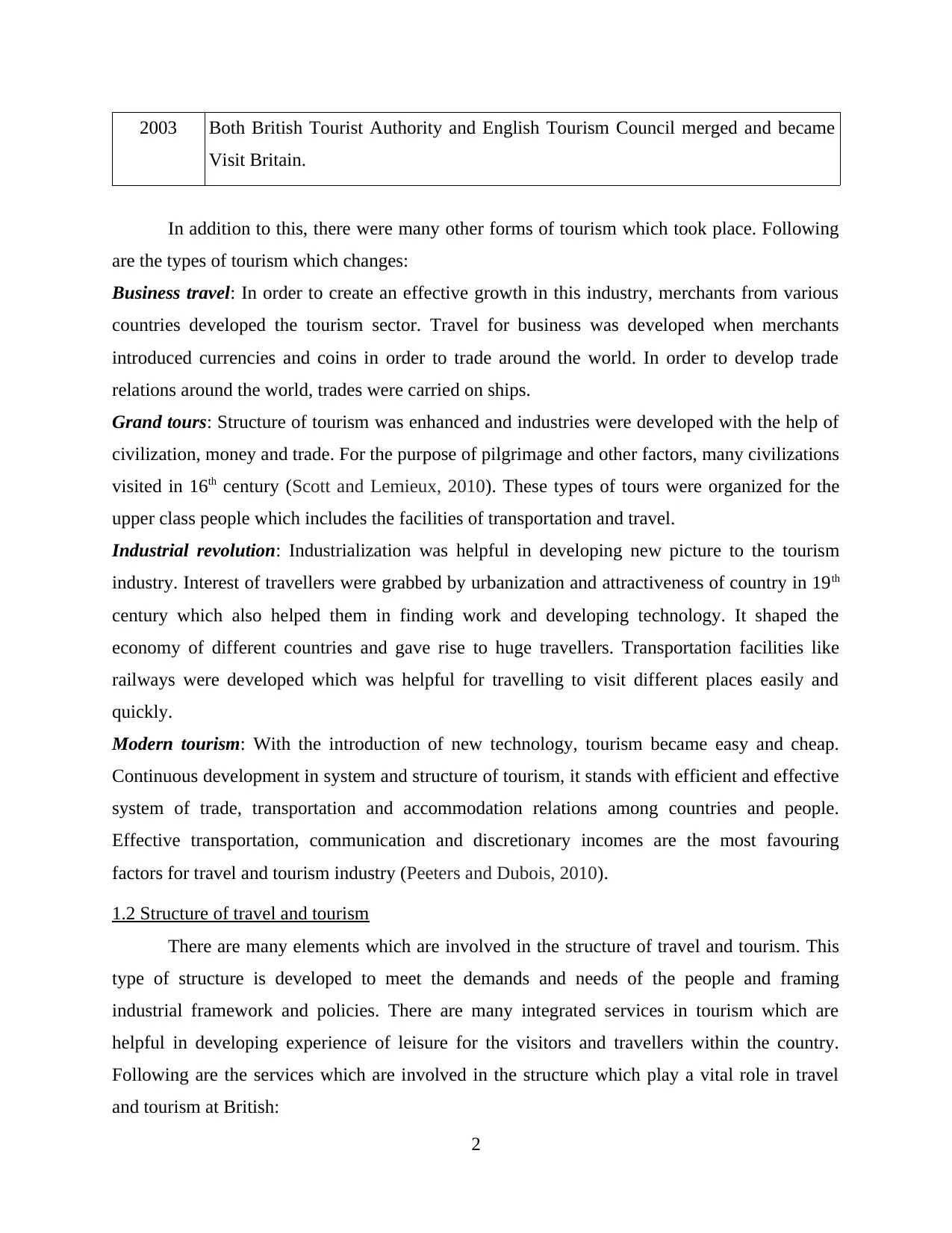
2003 Both British Tourist Authority and English Tourism Council merged and became
Visit Britain.
In addition to this, there were many other forms of tourism which took place. Following
are the types of tourism which changes:
Business travel: In order to create an effective growth in this industry, merchants from various
countries developed the tourism sector. Travel for business was developed when merchants
introduced currencies and coins in order to trade around the world. In order to develop trade
relations around the world, trades were carried on ships.
Grand tours: Structure of tourism was enhanced and industries were developed with the help of
civilization, money and trade. For the purpose of pilgrimage and other factors, many civilizations
visited in 16th century (Scott and Lemieux, 2010). These types of tours were organized for the
upper class people which includes the facilities of transportation and travel.
Industrial revolution: Industrialization was helpful in developing new picture to the tourism
industry. Interest of travellers were grabbed by urbanization and attractiveness of country in 19th
century which also helped them in finding work and developing technology. It shaped the
economy of different countries and gave rise to huge travellers. Transportation facilities like
railways were developed which was helpful for travelling to visit different places easily and
quickly.
Modern tourism: With the introduction of new technology, tourism became easy and cheap.
Continuous development in system and structure of tourism, it stands with efficient and effective
system of trade, transportation and accommodation relations among countries and people.
Effective transportation, communication and discretionary incomes are the most favouring
factors for travel and tourism industry (Peeters and Dubois, 2010).
1.2 Structure of travel and tourism
There are many elements which are involved in the structure of travel and tourism. This
type of structure is developed to meet the demands and needs of the people and framing
industrial framework and policies. There are many integrated services in tourism which are
helpful in developing experience of leisure for the visitors and travellers within the country.
Following are the services which are involved in the structure which play a vital role in travel
and tourism at British:
2
Visit Britain.
In addition to this, there were many other forms of tourism which took place. Following
are the types of tourism which changes:
Business travel: In order to create an effective growth in this industry, merchants from various
countries developed the tourism sector. Travel for business was developed when merchants
introduced currencies and coins in order to trade around the world. In order to develop trade
relations around the world, trades were carried on ships.
Grand tours: Structure of tourism was enhanced and industries were developed with the help of
civilization, money and trade. For the purpose of pilgrimage and other factors, many civilizations
visited in 16th century (Scott and Lemieux, 2010). These types of tours were organized for the
upper class people which includes the facilities of transportation and travel.
Industrial revolution: Industrialization was helpful in developing new picture to the tourism
industry. Interest of travellers were grabbed by urbanization and attractiveness of country in 19th
century which also helped them in finding work and developing technology. It shaped the
economy of different countries and gave rise to huge travellers. Transportation facilities like
railways were developed which was helpful for travelling to visit different places easily and
quickly.
Modern tourism: With the introduction of new technology, tourism became easy and cheap.
Continuous development in system and structure of tourism, it stands with efficient and effective
system of trade, transportation and accommodation relations among countries and people.
Effective transportation, communication and discretionary incomes are the most favouring
factors for travel and tourism industry (Peeters and Dubois, 2010).
1.2 Structure of travel and tourism
There are many elements which are involved in the structure of travel and tourism. This
type of structure is developed to meet the demands and needs of the people and framing
industrial framework and policies. There are many integrated services in tourism which are
helpful in developing experience of leisure for the visitors and travellers within the country.
Following are the services which are involved in the structure which play a vital role in travel
and tourism at British:
2
Paraphrase This Document
Need a fresh take? Get an instant paraphrase of this document with our AI Paraphraser
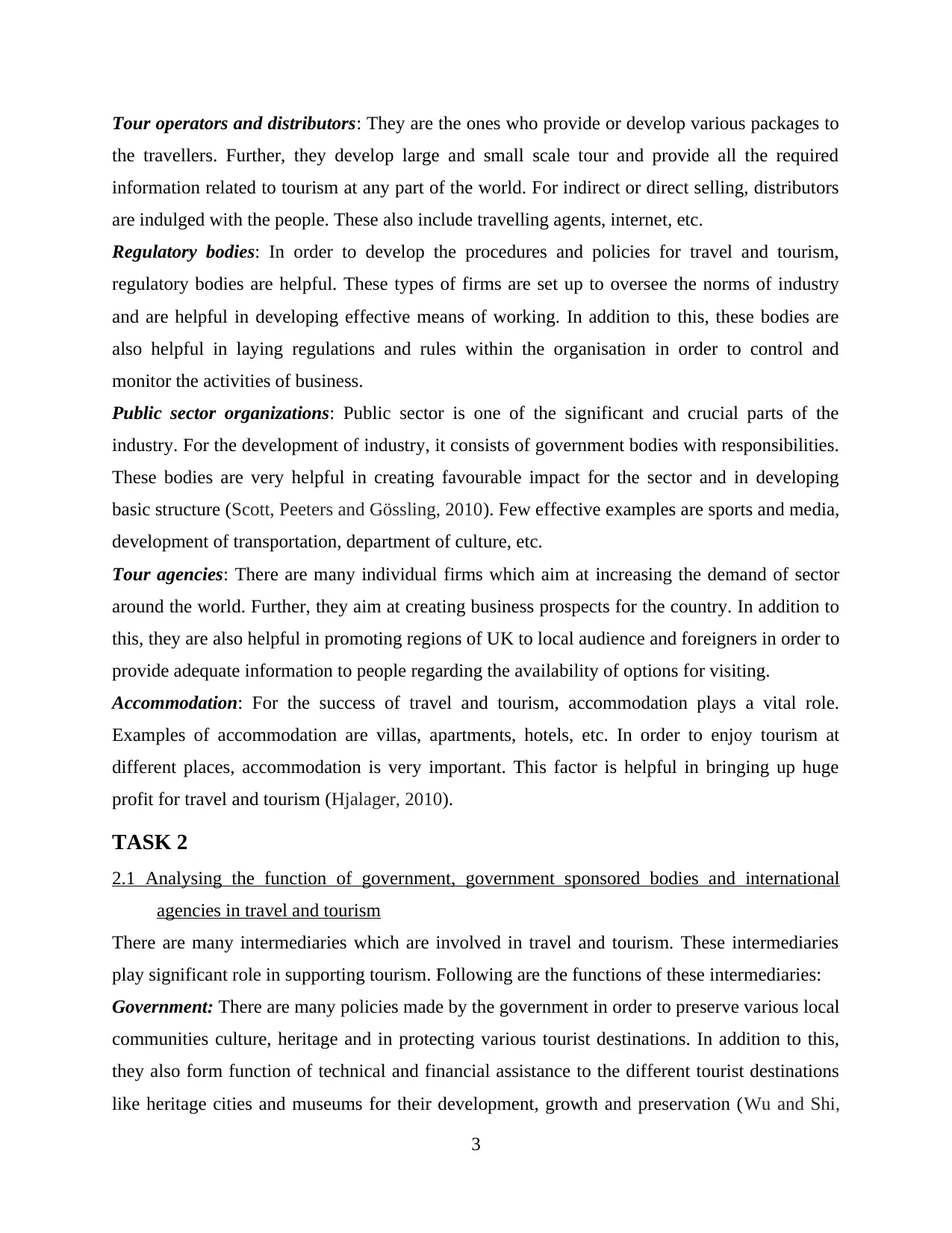
Tour operators and distributors: They are the ones who provide or develop various packages to
the travellers. Further, they develop large and small scale tour and provide all the required
information related to tourism at any part of the world. For indirect or direct selling, distributors
are indulged with the people. These also include travelling agents, internet, etc.
Regulatory bodies: In order to develop the procedures and policies for travel and tourism,
regulatory bodies are helpful. These types of firms are set up to oversee the norms of industry
and are helpful in developing effective means of working. In addition to this, these bodies are
also helpful in laying regulations and rules within the organisation in order to control and
monitor the activities of business.
Public sector organizations: Public sector is one of the significant and crucial parts of the
industry. For the development of industry, it consists of government bodies with responsibilities.
These bodies are very helpful in creating favourable impact for the sector and in developing
basic structure (Scott, Peeters and Gössling, 2010). Few effective examples are sports and media,
development of transportation, department of culture, etc.
Tour agencies: There are many individual firms which aim at increasing the demand of sector
around the world. Further, they aim at creating business prospects for the country. In addition to
this, they are also helpful in promoting regions of UK to local audience and foreigners in order to
provide adequate information to people regarding the availability of options for visiting.
Accommodation: For the success of travel and tourism, accommodation plays a vital role.
Examples of accommodation are villas, apartments, hotels, etc. In order to enjoy tourism at
different places, accommodation is very important. This factor is helpful in bringing up huge
profit for travel and tourism (Hjalager, 2010).
TASK 2
2.1 Analysing the function of government, government sponsored bodies and international
agencies in travel and tourism
There are many intermediaries which are involved in travel and tourism. These intermediaries
play significant role in supporting tourism. Following are the functions of these intermediaries:
Government: There are many policies made by the government in order to preserve various local
communities culture, heritage and in protecting various tourist destinations. In addition to this,
they also form function of technical and financial assistance to the different tourist destinations
like heritage cities and museums for their development, growth and preservation (Wu and Shi,
3
the travellers. Further, they develop large and small scale tour and provide all the required
information related to tourism at any part of the world. For indirect or direct selling, distributors
are indulged with the people. These also include travelling agents, internet, etc.
Regulatory bodies: In order to develop the procedures and policies for travel and tourism,
regulatory bodies are helpful. These types of firms are set up to oversee the norms of industry
and are helpful in developing effective means of working. In addition to this, these bodies are
also helpful in laying regulations and rules within the organisation in order to control and
monitor the activities of business.
Public sector organizations: Public sector is one of the significant and crucial parts of the
industry. For the development of industry, it consists of government bodies with responsibilities.
These bodies are very helpful in creating favourable impact for the sector and in developing
basic structure (Scott, Peeters and Gössling, 2010). Few effective examples are sports and media,
development of transportation, department of culture, etc.
Tour agencies: There are many individual firms which aim at increasing the demand of sector
around the world. Further, they aim at creating business prospects for the country. In addition to
this, they are also helpful in promoting regions of UK to local audience and foreigners in order to
provide adequate information to people regarding the availability of options for visiting.
Accommodation: For the success of travel and tourism, accommodation plays a vital role.
Examples of accommodation are villas, apartments, hotels, etc. In order to enjoy tourism at
different places, accommodation is very important. This factor is helpful in bringing up huge
profit for travel and tourism (Hjalager, 2010).
TASK 2
2.1 Analysing the function of government, government sponsored bodies and international
agencies in travel and tourism
There are many intermediaries which are involved in travel and tourism. These intermediaries
play significant role in supporting tourism. Following are the functions of these intermediaries:
Government: There are many policies made by the government in order to preserve various local
communities culture, heritage and in protecting various tourist destinations. In addition to this,
they also form function of technical and financial assistance to the different tourist destinations
like heritage cities and museums for their development, growth and preservation (Wu and Shi,
3
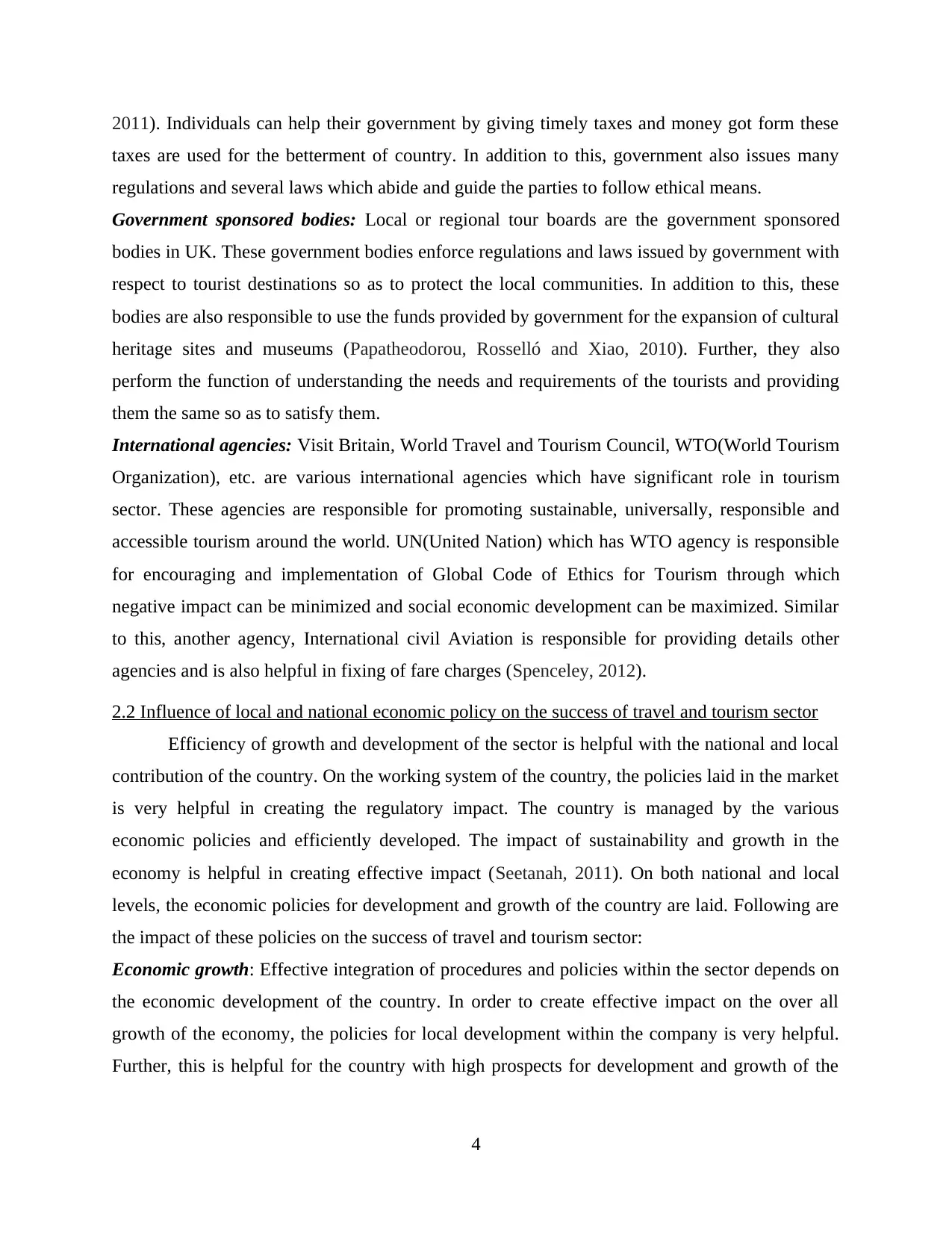
2011). Individuals can help their government by giving timely taxes and money got form these
taxes are used for the betterment of country. In addition to this, government also issues many
regulations and several laws which abide and guide the parties to follow ethical means.
Government sponsored bodies: Local or regional tour boards are the government sponsored
bodies in UK. These government bodies enforce regulations and laws issued by government with
respect to tourist destinations so as to protect the local communities. In addition to this, these
bodies are also responsible to use the funds provided by government for the expansion of cultural
heritage sites and museums (Papatheodorou, Rosselló and Xiao, 2010). Further, they also
perform the function of understanding the needs and requirements of the tourists and providing
them the same so as to satisfy them.
International agencies: Visit Britain, World Travel and Tourism Council, WTO(World Tourism
Organization), etc. are various international agencies which have significant role in tourism
sector. These agencies are responsible for promoting sustainable, universally, responsible and
accessible tourism around the world. UN(United Nation) which has WTO agency is responsible
for encouraging and implementation of Global Code of Ethics for Tourism through which
negative impact can be minimized and social economic development can be maximized. Similar
to this, another agency, International civil Aviation is responsible for providing details other
agencies and is also helpful in fixing of fare charges (Spenceley, 2012).
2.2 Influence of local and national economic policy on the success of travel and tourism sector
Efficiency of growth and development of the sector is helpful with the national and local
contribution of the country. On the working system of the country, the policies laid in the market
is very helpful in creating the regulatory impact. The country is managed by the various
economic policies and efficiently developed. The impact of sustainability and growth in the
economy is helpful in creating effective impact (Seetanah, 2011). On both national and local
levels, the economic policies for development and growth of the country are laid. Following are
the impact of these policies on the success of travel and tourism sector:
Economic growth: Effective integration of procedures and policies within the sector depends on
the economic development of the country. In order to create effective impact on the over all
growth of the economy, the policies for local development within the company is very helpful.
Further, this is helpful for the country with high prospects for development and growth of the
4
taxes are used for the betterment of country. In addition to this, government also issues many
regulations and several laws which abide and guide the parties to follow ethical means.
Government sponsored bodies: Local or regional tour boards are the government sponsored
bodies in UK. These government bodies enforce regulations and laws issued by government with
respect to tourist destinations so as to protect the local communities. In addition to this, these
bodies are also responsible to use the funds provided by government for the expansion of cultural
heritage sites and museums (Papatheodorou, Rosselló and Xiao, 2010). Further, they also
perform the function of understanding the needs and requirements of the tourists and providing
them the same so as to satisfy them.
International agencies: Visit Britain, World Travel and Tourism Council, WTO(World Tourism
Organization), etc. are various international agencies which have significant role in tourism
sector. These agencies are responsible for promoting sustainable, universally, responsible and
accessible tourism around the world. UN(United Nation) which has WTO agency is responsible
for encouraging and implementation of Global Code of Ethics for Tourism through which
negative impact can be minimized and social economic development can be maximized. Similar
to this, another agency, International civil Aviation is responsible for providing details other
agencies and is also helpful in fixing of fare charges (Spenceley, 2012).
2.2 Influence of local and national economic policy on the success of travel and tourism sector
Efficiency of growth and development of the sector is helpful with the national and local
contribution of the country. On the working system of the country, the policies laid in the market
is very helpful in creating the regulatory impact. The country is managed by the various
economic policies and efficiently developed. The impact of sustainability and growth in the
economy is helpful in creating effective impact (Seetanah, 2011). On both national and local
levels, the economic policies for development and growth of the country are laid. Following are
the impact of these policies on the success of travel and tourism sector:
Economic growth: Effective integration of procedures and policies within the sector depends on
the economic development of the country. In order to create effective impact on the over all
growth of the economy, the policies for local development within the company is very helpful.
Further, this is helpful for the country with high prospects for development and growth of the
4
⊘ This is a preview!⊘
Do you want full access?
Subscribe today to unlock all pages.

Trusted by 1+ million students worldwide
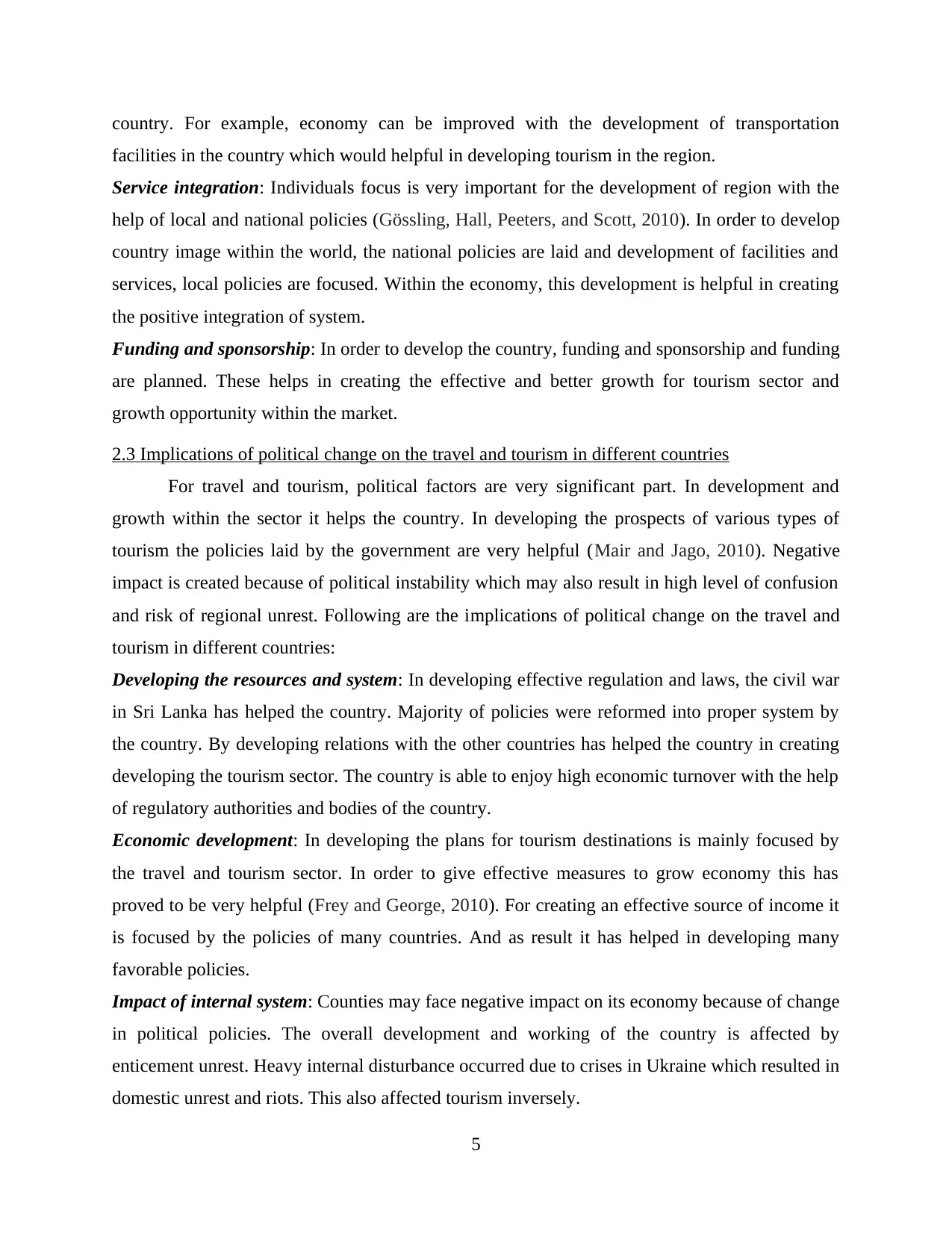
country. For example, economy can be improved with the development of transportation
facilities in the country which would helpful in developing tourism in the region.
Service integration: Individuals focus is very important for the development of region with the
help of local and national policies (Gössling, Hall, Peeters, and Scott, 2010). In order to develop
country image within the world, the national policies are laid and development of facilities and
services, local policies are focused. Within the economy, this development is helpful in creating
the positive integration of system.
Funding and sponsorship: In order to develop the country, funding and sponsorship and funding
are planned. These helps in creating the effective and better growth for tourism sector and
growth opportunity within the market.
2.3 Implications of political change on the travel and tourism in different countries
For travel and tourism, political factors are very significant part. In development and
growth within the sector it helps the country. In developing the prospects of various types of
tourism the policies laid by the government are very helpful (Mair and Jago, 2010). Negative
impact is created because of political instability which may also result in high level of confusion
and risk of regional unrest. Following are the implications of political change on the travel and
tourism in different countries:
Developing the resources and system: In developing effective regulation and laws, the civil war
in Sri Lanka has helped the country. Majority of policies were reformed into proper system by
the country. By developing relations with the other countries has helped the country in creating
developing the tourism sector. The country is able to enjoy high economic turnover with the help
of regulatory authorities and bodies of the country.
Economic development: In developing the plans for tourism destinations is mainly focused by
the travel and tourism sector. In order to give effective measures to grow economy this has
proved to be very helpful (Frey and George, 2010). For creating an effective source of income it
is focused by the policies of many countries. And as result it has helped in developing many
favorable policies.
Impact of internal system: Counties may face negative impact on its economy because of change
in political policies. The overall development and working of the country is affected by
enticement unrest. Heavy internal disturbance occurred due to crises in Ukraine which resulted in
domestic unrest and riots. This also affected tourism inversely.
5
facilities in the country which would helpful in developing tourism in the region.
Service integration: Individuals focus is very important for the development of region with the
help of local and national policies (Gössling, Hall, Peeters, and Scott, 2010). In order to develop
country image within the world, the national policies are laid and development of facilities and
services, local policies are focused. Within the economy, this development is helpful in creating
the positive integration of system.
Funding and sponsorship: In order to develop the country, funding and sponsorship and funding
are planned. These helps in creating the effective and better growth for tourism sector and
growth opportunity within the market.
2.3 Implications of political change on the travel and tourism in different countries
For travel and tourism, political factors are very significant part. In development and
growth within the sector it helps the country. In developing the prospects of various types of
tourism the policies laid by the government are very helpful (Mair and Jago, 2010). Negative
impact is created because of political instability which may also result in high level of confusion
and risk of regional unrest. Following are the implications of political change on the travel and
tourism in different countries:
Developing the resources and system: In developing effective regulation and laws, the civil war
in Sri Lanka has helped the country. Majority of policies were reformed into proper system by
the country. By developing relations with the other countries has helped the country in creating
developing the tourism sector. The country is able to enjoy high economic turnover with the help
of regulatory authorities and bodies of the country.
Economic development: In developing the plans for tourism destinations is mainly focused by
the travel and tourism sector. In order to give effective measures to grow economy this has
proved to be very helpful (Frey and George, 2010). For creating an effective source of income it
is focused by the policies of many countries. And as result it has helped in developing many
favorable policies.
Impact of internal system: Counties may face negative impact on its economy because of change
in political policies. The overall development and working of the country is affected by
enticement unrest. Heavy internal disturbance occurred due to crises in Ukraine which resulted in
domestic unrest and riots. This also affected tourism inversely.
5
Paraphrase This Document
Need a fresh take? Get an instant paraphrase of this document with our AI Paraphraser
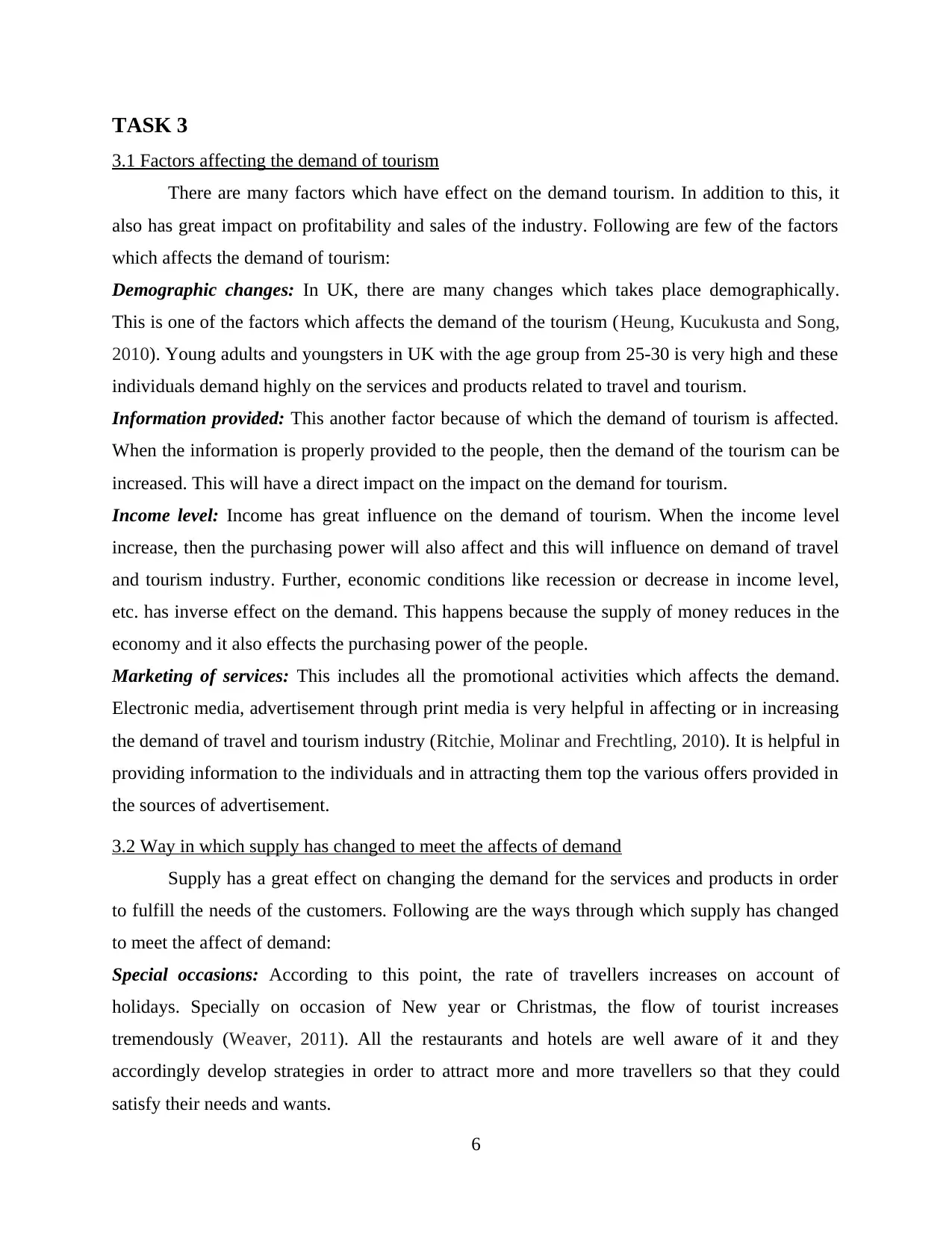
TASK 3
3.1 Factors affecting the demand of tourism
There are many factors which have effect on the demand tourism. In addition to this, it
also has great impact on profitability and sales of the industry. Following are few of the factors
which affects the demand of tourism:
Demographic changes: In UK, there are many changes which takes place demographically.
This is one of the factors which affects the demand of the tourism (Heung, Kucukusta and Song,
2010). Young adults and youngsters in UK with the age group from 25-30 is very high and these
individuals demand highly on the services and products related to travel and tourism.
Information provided: This another factor because of which the demand of tourism is affected.
When the information is properly provided to the people, then the demand of the tourism can be
increased. This will have a direct impact on the impact on the demand for tourism.
Income level: Income has great influence on the demand of tourism. When the income level
increase, then the purchasing power will also affect and this will influence on demand of travel
and tourism industry. Further, economic conditions like recession or decrease in income level,
etc. has inverse effect on the demand. This happens because the supply of money reduces in the
economy and it also effects the purchasing power of the people.
Marketing of services: This includes all the promotional activities which affects the demand.
Electronic media, advertisement through print media is very helpful in affecting or in increasing
the demand of travel and tourism industry (Ritchie, Molinar and Frechtling, 2010). It is helpful in
providing information to the individuals and in attracting them top the various offers provided in
the sources of advertisement.
3.2 Way in which supply has changed to meet the affects of demand
Supply has a great effect on changing the demand for the services and products in order
to fulfill the needs of the customers. Following are the ways through which supply has changed
to meet the affect of demand:
Special occasions: According to this point, the rate of travellers increases on account of
holidays. Specially on occasion of New year or Christmas, the flow of tourist increases
tremendously (Weaver, 2011). All the restaurants and hotels are well aware of it and they
accordingly develop strategies in order to attract more and more travellers so that they could
satisfy their needs and wants.
6
3.1 Factors affecting the demand of tourism
There are many factors which have effect on the demand tourism. In addition to this, it
also has great impact on profitability and sales of the industry. Following are few of the factors
which affects the demand of tourism:
Demographic changes: In UK, there are many changes which takes place demographically.
This is one of the factors which affects the demand of the tourism (Heung, Kucukusta and Song,
2010). Young adults and youngsters in UK with the age group from 25-30 is very high and these
individuals demand highly on the services and products related to travel and tourism.
Information provided: This another factor because of which the demand of tourism is affected.
When the information is properly provided to the people, then the demand of the tourism can be
increased. This will have a direct impact on the impact on the demand for tourism.
Income level: Income has great influence on the demand of tourism. When the income level
increase, then the purchasing power will also affect and this will influence on demand of travel
and tourism industry. Further, economic conditions like recession or decrease in income level,
etc. has inverse effect on the demand. This happens because the supply of money reduces in the
economy and it also effects the purchasing power of the people.
Marketing of services: This includes all the promotional activities which affects the demand.
Electronic media, advertisement through print media is very helpful in affecting or in increasing
the demand of travel and tourism industry (Ritchie, Molinar and Frechtling, 2010). It is helpful in
providing information to the individuals and in attracting them top the various offers provided in
the sources of advertisement.
3.2 Way in which supply has changed to meet the affects of demand
Supply has a great effect on changing the demand for the services and products in order
to fulfill the needs of the customers. Following are the ways through which supply has changed
to meet the affect of demand:
Special occasions: According to this point, the rate of travellers increases on account of
holidays. Specially on occasion of New year or Christmas, the flow of tourist increases
tremendously (Weaver, 2011). All the restaurants and hotels are well aware of it and they
accordingly develop strategies in order to attract more and more travellers so that they could
satisfy their needs and wants.
6
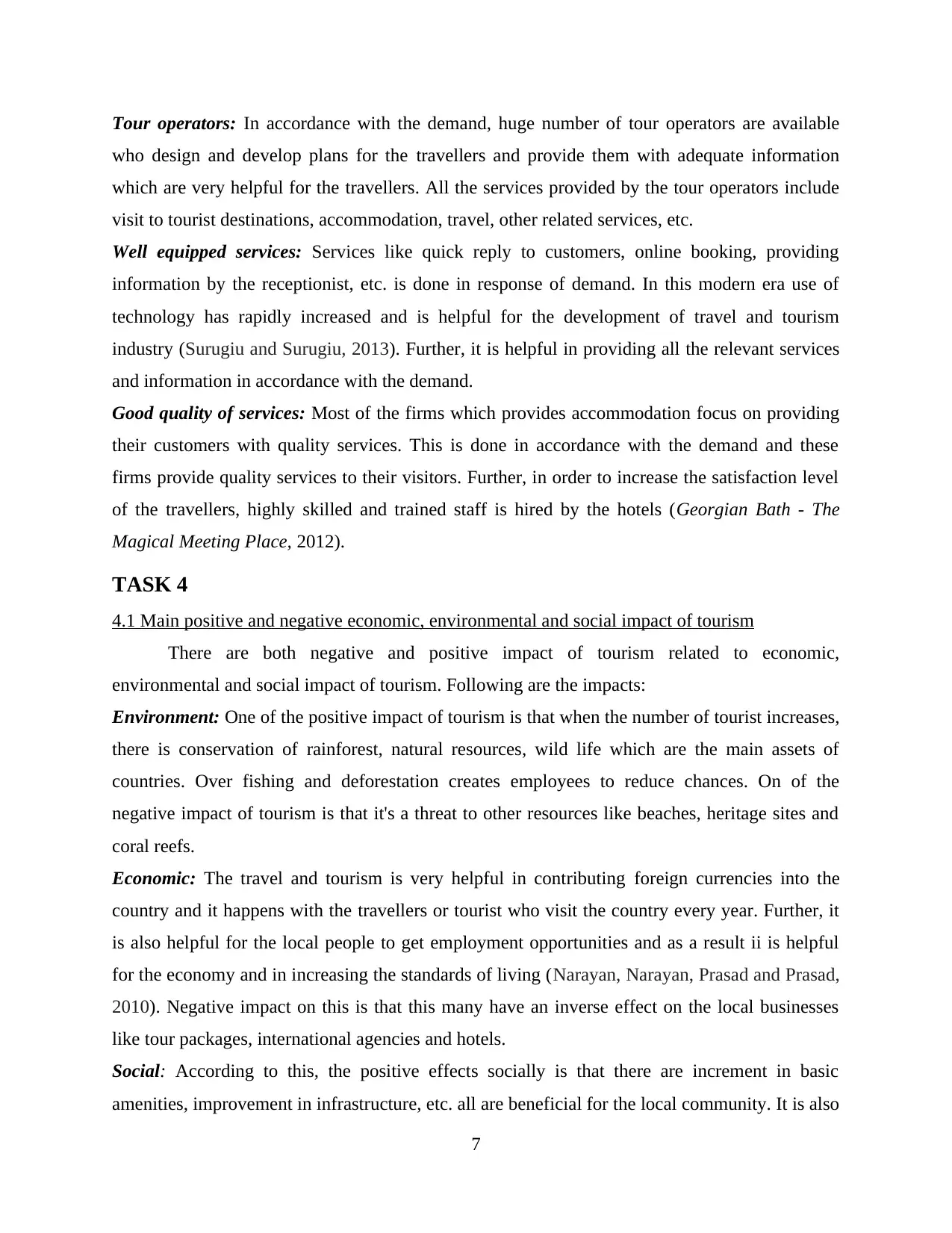
Tour operators: In accordance with the demand, huge number of tour operators are available
who design and develop plans for the travellers and provide them with adequate information
which are very helpful for the travellers. All the services provided by the tour operators include
visit to tourist destinations, accommodation, travel, other related services, etc.
Well equipped services: Services like quick reply to customers, online booking, providing
information by the receptionist, etc. is done in response of demand. In this modern era use of
technology has rapidly increased and is helpful for the development of travel and tourism
industry (Surugiu and Surugiu, 2013). Further, it is helpful in providing all the relevant services
and information in accordance with the demand.
Good quality of services: Most of the firms which provides accommodation focus on providing
their customers with quality services. This is done in accordance with the demand and these
firms provide quality services to their visitors. Further, in order to increase the satisfaction level
of the travellers, highly skilled and trained staff is hired by the hotels (Georgian Bath - The
Magical Meeting Place, 2012).
TASK 4
4.1 Main positive and negative economic, environmental and social impact of tourism
There are both negative and positive impact of tourism related to economic,
environmental and social impact of tourism. Following are the impacts:
Environment: One of the positive impact of tourism is that when the number of tourist increases,
there is conservation of rainforest, natural resources, wild life which are the main assets of
countries. Over fishing and deforestation creates employees to reduce chances. On of the
negative impact of tourism is that it's a threat to other resources like beaches, heritage sites and
coral reefs.
Economic: The travel and tourism is very helpful in contributing foreign currencies into the
country and it happens with the travellers or tourist who visit the country every year. Further, it
is also helpful for the local people to get employment opportunities and as a result ii is helpful
for the economy and in increasing the standards of living (Narayan, Narayan, Prasad and Prasad,
2010). Negative impact on this is that this many have an inverse effect on the local businesses
like tour packages, international agencies and hotels.
Social: According to this, the positive effects socially is that there are increment in basic
amenities, improvement in infrastructure, etc. all are beneficial for the local community. It is also
7
who design and develop plans for the travellers and provide them with adequate information
which are very helpful for the travellers. All the services provided by the tour operators include
visit to tourist destinations, accommodation, travel, other related services, etc.
Well equipped services: Services like quick reply to customers, online booking, providing
information by the receptionist, etc. is done in response of demand. In this modern era use of
technology has rapidly increased and is helpful for the development of travel and tourism
industry (Surugiu and Surugiu, 2013). Further, it is helpful in providing all the relevant services
and information in accordance with the demand.
Good quality of services: Most of the firms which provides accommodation focus on providing
their customers with quality services. This is done in accordance with the demand and these
firms provide quality services to their visitors. Further, in order to increase the satisfaction level
of the travellers, highly skilled and trained staff is hired by the hotels (Georgian Bath - The
Magical Meeting Place, 2012).
TASK 4
4.1 Main positive and negative economic, environmental and social impact of tourism
There are both negative and positive impact of tourism related to economic,
environmental and social impact of tourism. Following are the impacts:
Environment: One of the positive impact of tourism is that when the number of tourist increases,
there is conservation of rainforest, natural resources, wild life which are the main assets of
countries. Over fishing and deforestation creates employees to reduce chances. On of the
negative impact of tourism is that it's a threat to other resources like beaches, heritage sites and
coral reefs.
Economic: The travel and tourism is very helpful in contributing foreign currencies into the
country and it happens with the travellers or tourist who visit the country every year. Further, it
is also helpful for the local people to get employment opportunities and as a result ii is helpful
for the economy and in increasing the standards of living (Narayan, Narayan, Prasad and Prasad,
2010). Negative impact on this is that this many have an inverse effect on the local businesses
like tour packages, international agencies and hotels.
Social: According to this, the positive effects socially is that there are increment in basic
amenities, improvement in infrastructure, etc. all are beneficial for the local community. It is also
7
⊘ This is a preview!⊘
Do you want full access?
Subscribe today to unlock all pages.

Trusted by 1+ million students worldwide
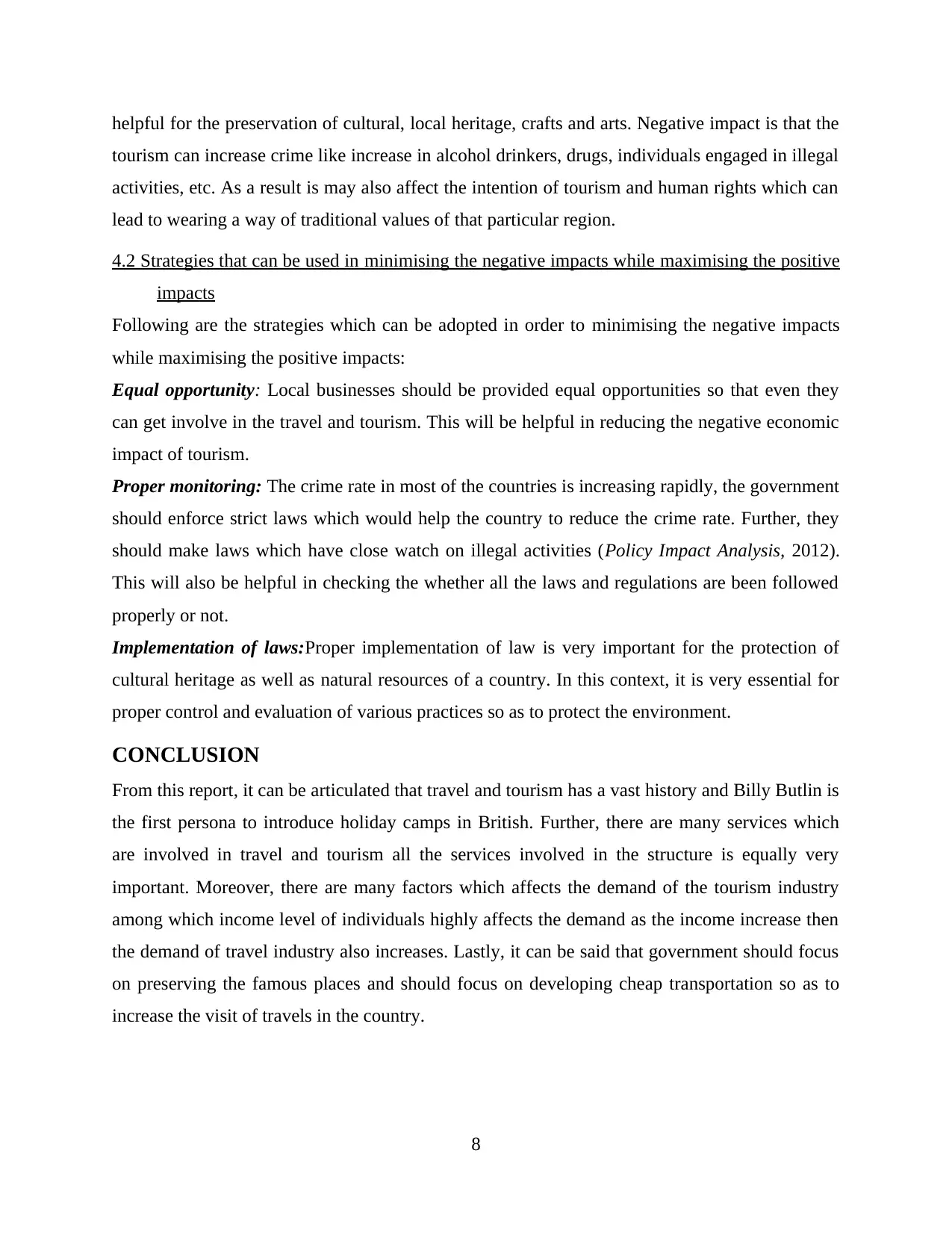
helpful for the preservation of cultural, local heritage, crafts and arts. Negative impact is that the
tourism can increase crime like increase in alcohol drinkers, drugs, individuals engaged in illegal
activities, etc. As a result is may also affect the intention of tourism and human rights which can
lead to wearing a way of traditional values of that particular region.
4.2 Strategies that can be used in minimising the negative impacts while maximising the positive
impacts
Following are the strategies which can be adopted in order to minimising the negative impacts
while maximising the positive impacts:
Equal opportunity: Local businesses should be provided equal opportunities so that even they
can get involve in the travel and tourism. This will be helpful in reducing the negative economic
impact of tourism.
Proper monitoring: The crime rate in most of the countries is increasing rapidly, the government
should enforce strict laws which would help the country to reduce the crime rate. Further, they
should make laws which have close watch on illegal activities (Policy Impact Analysis, 2012).
This will also be helpful in checking the whether all the laws and regulations are been followed
properly or not.
Implementation of laws:Proper implementation of law is very important for the protection of
cultural heritage as well as natural resources of a country. In this context, it is very essential for
proper control and evaluation of various practices so as to protect the environment.
CONCLUSION
From this report, it can be articulated that travel and tourism has a vast history and Billy Butlin is
the first persona to introduce holiday camps in British. Further, there are many services which
are involved in travel and tourism all the services involved in the structure is equally very
important. Moreover, there are many factors which affects the demand of the tourism industry
among which income level of individuals highly affects the demand as the income increase then
the demand of travel industry also increases. Lastly, it can be said that government should focus
on preserving the famous places and should focus on developing cheap transportation so as to
increase the visit of travels in the country.
8
tourism can increase crime like increase in alcohol drinkers, drugs, individuals engaged in illegal
activities, etc. As a result is may also affect the intention of tourism and human rights which can
lead to wearing a way of traditional values of that particular region.
4.2 Strategies that can be used in minimising the negative impacts while maximising the positive
impacts
Following are the strategies which can be adopted in order to minimising the negative impacts
while maximising the positive impacts:
Equal opportunity: Local businesses should be provided equal opportunities so that even they
can get involve in the travel and tourism. This will be helpful in reducing the negative economic
impact of tourism.
Proper monitoring: The crime rate in most of the countries is increasing rapidly, the government
should enforce strict laws which would help the country to reduce the crime rate. Further, they
should make laws which have close watch on illegal activities (Policy Impact Analysis, 2012).
This will also be helpful in checking the whether all the laws and regulations are been followed
properly or not.
Implementation of laws:Proper implementation of law is very important for the protection of
cultural heritage as well as natural resources of a country. In this context, it is very essential for
proper control and evaluation of various practices so as to protect the environment.
CONCLUSION
From this report, it can be articulated that travel and tourism has a vast history and Billy Butlin is
the first persona to introduce holiday camps in British. Further, there are many services which
are involved in travel and tourism all the services involved in the structure is equally very
important. Moreover, there are many factors which affects the demand of the tourism industry
among which income level of individuals highly affects the demand as the income increase then
the demand of travel industry also increases. Lastly, it can be said that government should focus
on preserving the famous places and should focus on developing cheap transportation so as to
increase the visit of travels in the country.
8
Paraphrase This Document
Need a fresh take? Get an instant paraphrase of this document with our AI Paraphraser
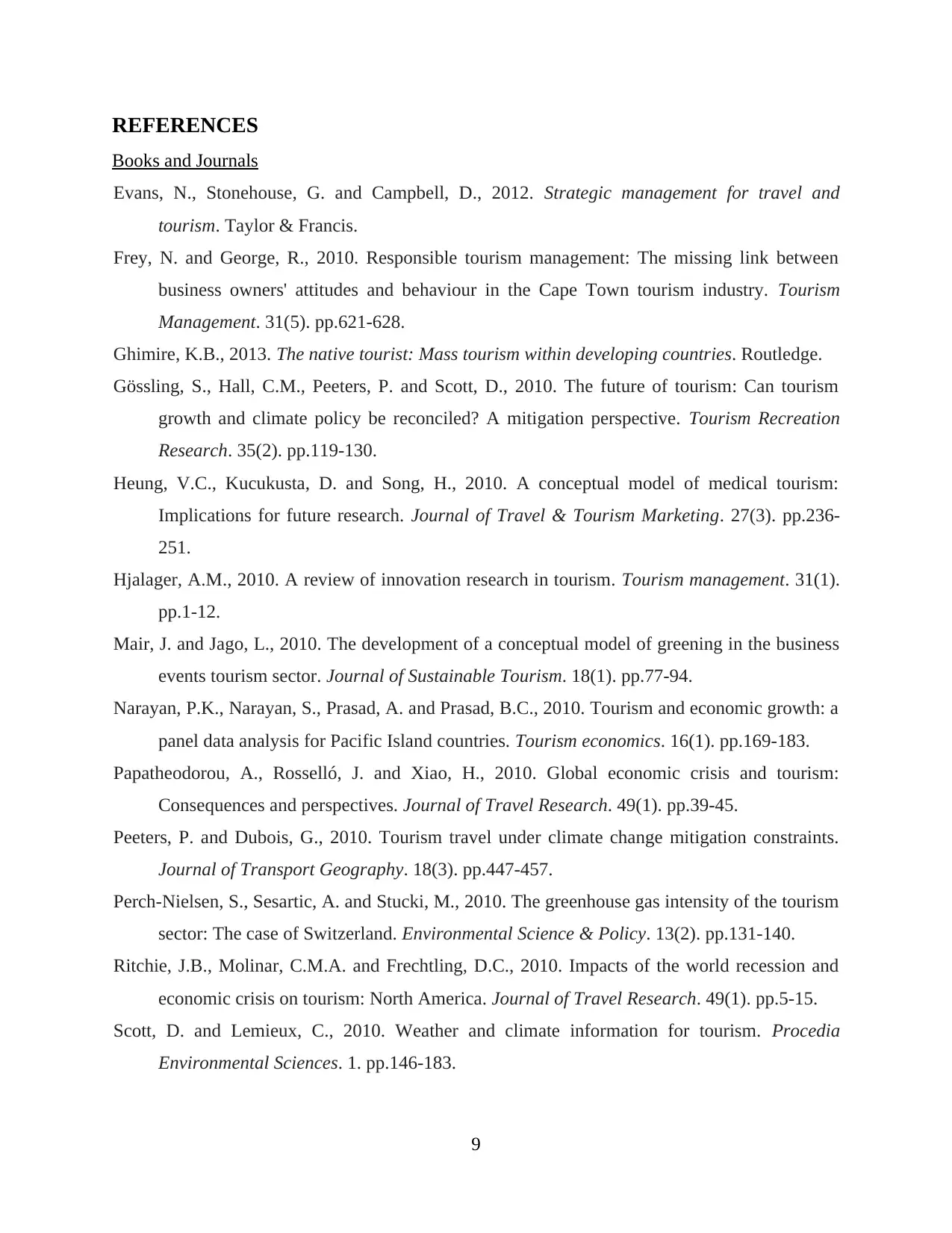
REFERENCES
Books and Journals
Evans, N., Stonehouse, G. and Campbell, D., 2012. Strategic management for travel and
tourism. Taylor & Francis.
Frey, N. and George, R., 2010. Responsible tourism management: The missing link between
business owners' attitudes and behaviour in the Cape Town tourism industry. Tourism
Management. 31(5). pp.621-628.
Ghimire, K.B., 2013. The native tourist: Mass tourism within developing countries. Routledge.
Gössling, S., Hall, C.M., Peeters, P. and Scott, D., 2010. The future of tourism: Can tourism
growth and climate policy be reconciled? A mitigation perspective. Tourism Recreation
Research. 35(2). pp.119-130.
Heung, V.C., Kucukusta, D. and Song, H., 2010. A conceptual model of medical tourism:
Implications for future research. Journal of Travel & Tourism Marketing. 27(3). pp.236-
251.
Hjalager, A.M., 2010. A review of innovation research in tourism. Tourism management. 31(1).
pp.1-12.
Mair, J. and Jago, L., 2010. The development of a conceptual model of greening in the business
events tourism sector. Journal of Sustainable Tourism. 18(1). pp.77-94.
Narayan, P.K., Narayan, S., Prasad, A. and Prasad, B.C., 2010. Tourism and economic growth: a
panel data analysis for Pacific Island countries. Tourism economics. 16(1). pp.169-183.
Papatheodorou, A., Rosselló, J. and Xiao, H., 2010. Global economic crisis and tourism:
Consequences and perspectives. Journal of Travel Research. 49(1). pp.39-45.
Peeters, P. and Dubois, G., 2010. Tourism travel under climate change mitigation constraints.
Journal of Transport Geography. 18(3). pp.447-457.
Perch-Nielsen, S., Sesartic, A. and Stucki, M., 2010. The greenhouse gas intensity of the tourism
sector: The case of Switzerland. Environmental Science & Policy. 13(2). pp.131-140.
Ritchie, J.B., Molinar, C.M.A. and Frechtling, D.C., 2010. Impacts of the world recession and
economic crisis on tourism: North America. Journal of Travel Research. 49(1). pp.5-15.
Scott, D. and Lemieux, C., 2010. Weather and climate information for tourism. Procedia
Environmental Sciences. 1. pp.146-183.
9
Books and Journals
Evans, N., Stonehouse, G. and Campbell, D., 2012. Strategic management for travel and
tourism. Taylor & Francis.
Frey, N. and George, R., 2010. Responsible tourism management: The missing link between
business owners' attitudes and behaviour in the Cape Town tourism industry. Tourism
Management. 31(5). pp.621-628.
Ghimire, K.B., 2013. The native tourist: Mass tourism within developing countries. Routledge.
Gössling, S., Hall, C.M., Peeters, P. and Scott, D., 2010. The future of tourism: Can tourism
growth and climate policy be reconciled? A mitigation perspective. Tourism Recreation
Research. 35(2). pp.119-130.
Heung, V.C., Kucukusta, D. and Song, H., 2010. A conceptual model of medical tourism:
Implications for future research. Journal of Travel & Tourism Marketing. 27(3). pp.236-
251.
Hjalager, A.M., 2010. A review of innovation research in tourism. Tourism management. 31(1).
pp.1-12.
Mair, J. and Jago, L., 2010. The development of a conceptual model of greening in the business
events tourism sector. Journal of Sustainable Tourism. 18(1). pp.77-94.
Narayan, P.K., Narayan, S., Prasad, A. and Prasad, B.C., 2010. Tourism and economic growth: a
panel data analysis for Pacific Island countries. Tourism economics. 16(1). pp.169-183.
Papatheodorou, A., Rosselló, J. and Xiao, H., 2010. Global economic crisis and tourism:
Consequences and perspectives. Journal of Travel Research. 49(1). pp.39-45.
Peeters, P. and Dubois, G., 2010. Tourism travel under climate change mitigation constraints.
Journal of Transport Geography. 18(3). pp.447-457.
Perch-Nielsen, S., Sesartic, A. and Stucki, M., 2010. The greenhouse gas intensity of the tourism
sector: The case of Switzerland. Environmental Science & Policy. 13(2). pp.131-140.
Ritchie, J.B., Molinar, C.M.A. and Frechtling, D.C., 2010. Impacts of the world recession and
economic crisis on tourism: North America. Journal of Travel Research. 49(1). pp.5-15.
Scott, D. and Lemieux, C., 2010. Weather and climate information for tourism. Procedia
Environmental Sciences. 1. pp.146-183.
9
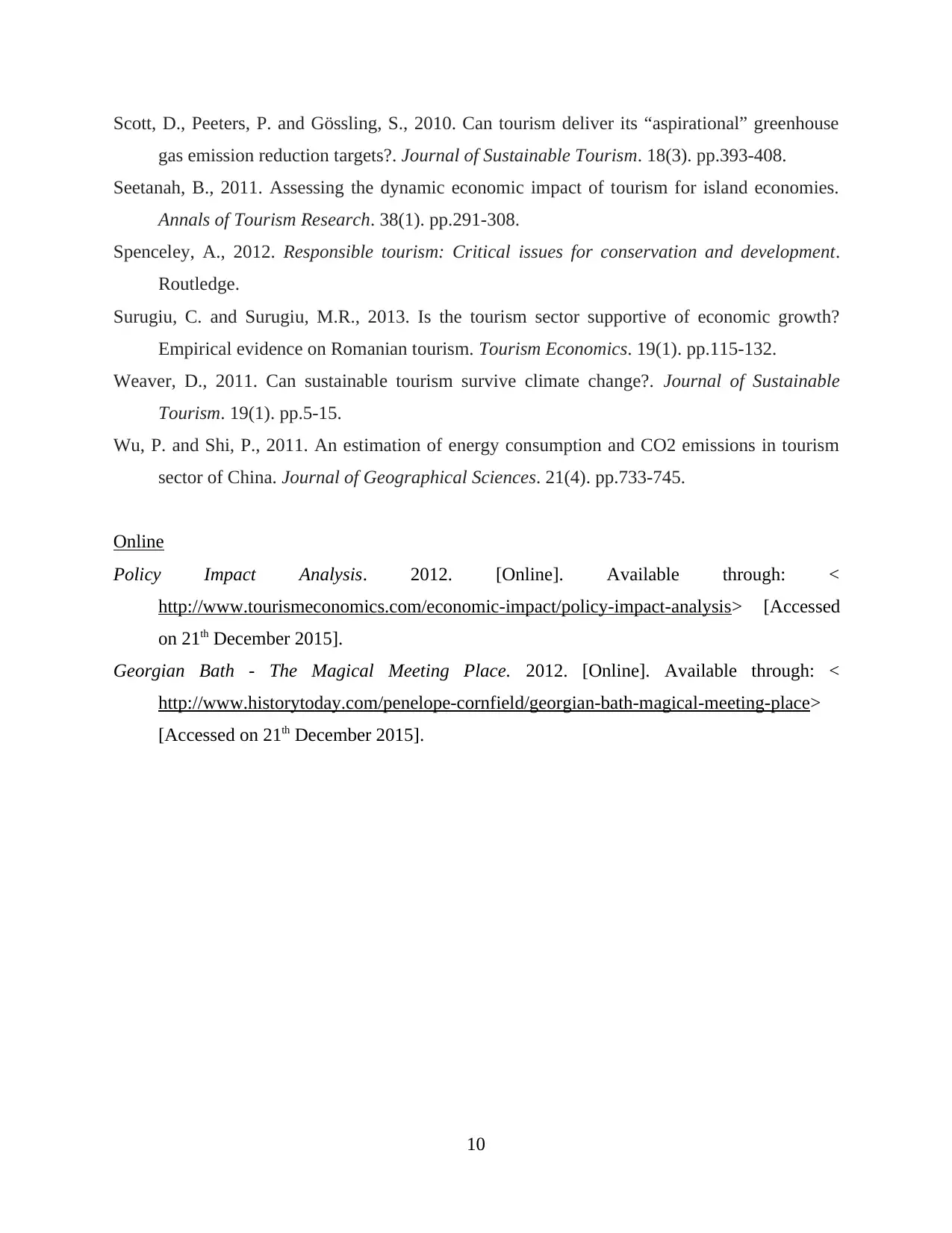
Scott, D., Peeters, P. and Gössling, S., 2010. Can tourism deliver its “aspirational” greenhouse
gas emission reduction targets?. Journal of Sustainable Tourism. 18(3). pp.393-408.
Seetanah, B., 2011. Assessing the dynamic economic impact of tourism for island economies.
Annals of Tourism Research. 38(1). pp.291-308.
Spenceley, A., 2012. Responsible tourism: Critical issues for conservation and development.
Routledge.
Surugiu, C. and Surugiu, M.R., 2013. Is the tourism sector supportive of economic growth?
Empirical evidence on Romanian tourism. Tourism Economics. 19(1). pp.115-132.
Weaver, D., 2011. Can sustainable tourism survive climate change?. Journal of Sustainable
Tourism. 19(1). pp.5-15.
Wu, P. and Shi, P., 2011. An estimation of energy consumption and CO2 emissions in tourism
sector of China. Journal of Geographical Sciences. 21(4). pp.733-745.
Online
Policy Impact Analysis. 2012. [Online]. Available through: <
http://www.tourismeconomics.com/economic-impact/policy-impact-analysis> [Accessed
on 21th December 2015].
Georgian Bath - The Magical Meeting Place. 2012. [Online]. Available through: <
http://www.historytoday.com/penelope-cornfield/georgian-bath-magical-meeting-place>
[Accessed on 21th December 2015].
10
gas emission reduction targets?. Journal of Sustainable Tourism. 18(3). pp.393-408.
Seetanah, B., 2011. Assessing the dynamic economic impact of tourism for island economies.
Annals of Tourism Research. 38(1). pp.291-308.
Spenceley, A., 2012. Responsible tourism: Critical issues for conservation and development.
Routledge.
Surugiu, C. and Surugiu, M.R., 2013. Is the tourism sector supportive of economic growth?
Empirical evidence on Romanian tourism. Tourism Economics. 19(1). pp.115-132.
Weaver, D., 2011. Can sustainable tourism survive climate change?. Journal of Sustainable
Tourism. 19(1). pp.5-15.
Wu, P. and Shi, P., 2011. An estimation of energy consumption and CO2 emissions in tourism
sector of China. Journal of Geographical Sciences. 21(4). pp.733-745.
Online
Policy Impact Analysis. 2012. [Online]. Available through: <
http://www.tourismeconomics.com/economic-impact/policy-impact-analysis> [Accessed
on 21th December 2015].
Georgian Bath - The Magical Meeting Place. 2012. [Online]. Available through: <
http://www.historytoday.com/penelope-cornfield/georgian-bath-magical-meeting-place>
[Accessed on 21th December 2015].
10
⊘ This is a preview!⊘
Do you want full access?
Subscribe today to unlock all pages.

Trusted by 1+ million students worldwide
1 out of 12
Related Documents
Your All-in-One AI-Powered Toolkit for Academic Success.
+13062052269
info@desklib.com
Available 24*7 on WhatsApp / Email
![[object Object]](/_next/static/media/star-bottom.7253800d.svg)
Unlock your academic potential
Copyright © 2020–2025 A2Z Services. All Rights Reserved. Developed and managed by ZUCOL.





